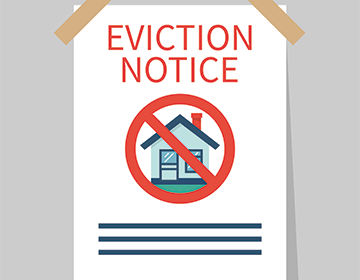Agents and landlords must now give tenants six months’ notice before they can evict, except in the most serious of cases, such as incidents of anti-social behaviour and domestic abuse.
On Friday the government made the announcement - just a few hours ahead of the start of the Bank Holiday weekend - and the new rules came into effect the next day, Saturday.
So from now until March next year landlords and agents must provide at least six months’ notice period prior to seeking possession through the courts in most cases, including section 21 evictions and rent arrears under six months.
Notices served on and before August 28 are not affected by these changes, and must be at least three months.
Exceptions apply for the worst cases to seek possession; these are:
- anti-social behaviour (now 4 weeks’ notice);
- domestic abuse (now 2 to 4 weeks’ notice;
- false statement (now 2 to 4 weeks’ notice);
- over six months’ accumulated rent arrears (now 4 weeks’ notice);
- breach of immigration rules ‘Right to Rent’ (now three months’ notice).
In addition, new court rules have been agreed, which will come into force on September 20 meaning landlords will need to set out in their claim any relevant information about a tenant’s circumstances, including information on the effect of the COVID-19 pandemic.
Where this information is not provided, judges will have the ability to adjourn proceedings.
“We have developed a package of support for renters to ensure they continue to be protected over winter. I have changed the law so that renters are protected by a six month notice period until March 2021” says Housing Secretary Robert Jenrick.
“No tenant will have been legally evicted for six months at the height of the pandemic as the stay on possession proceedings has been extended until September 20.
“For the most egregious cases, for example those involving anti-social behaviour or domestic abuse perpetrators, notice periods have returned to their normal level, and landlords will be able to progress serious rent arrears cases more quickly.
“These changes will support landlords to progress the priority cases while keeping the public safe over winter. We will keep these measures under review and decisions will continue to be guided by the latest public health advice.”
Jenrick adds that from September 20 when the eviction ban lapses “courts will carefully prioritise the most egregious cases, including anti-social behaviour, fraud, and domestic abuse, ensuring landlords are able to progress the most serious cases, such as those involving anti-social behaviour and other crimes.”
It remains the case that if a landlord made a claim to the court before August 3 they must notify the court and their tenant that they still intend to seek repossession before the case will proceed, including in section 21 cases.
“More detailed guidance on using the courts and the new arrangements will be made available in advance of possession proceedings starting again” according to the Ministry of Housing, Communities and Local Government.
“We are conscious of the pressure on landlords during this difficult time and do not want to exacerbate this. Of course, it is important that tenants who are able to do so must continue to pay their rent.”












%20-%20IMAGE%20Client%20Accounting%20%E2%80%93%20what%20are%20your%20options.jpg)

.png)


%20(002).png)

%20(002).jpg)










Join the conversation
Jump to latest comment and add your reply
What the Government Is doing to Private Landlords is immoral. If they want people to remain in properties without paying rent then they should pay the rent, it’s called social Housing. They should end the disgraceful practices of paying housing benefit direct to tenants who don’t pass it on to landlords and of allowing local authorities to tell tenants never to leave until evicted. There has to be rules but they should be fair to both sides, what’s happening right now is a disgrace
FHL is the only way! I would not consider tenants: not in this country!
My tenant send me a phone message at beginning of lockdown still owing two months rent at that time, that the government has told them to stop paying rent and landlords should go on mortgage holiday.
This is someone who receives housing benefit, she has been owing me rent since FEBRUARY 2020. I approach the council on this matter, but they told me that can not help me. I have tried by all means to have a meaningful conversation with the tenant but all to no avail. Her only response are, that I am disturbing her, and if ever want my property back that I will have evict her. I now have to do two jobs and burning my savings in order to keep my mortgage. It is depressing and no one cares.
This is a three bedroom property fully furnished all brand new. And this person has been living rent free for 8months without remorse nor consideration. These are the people the government are protecting, destroying the hard works of good citizens for the sake of the ingratitude. I hope the TORIES AFTER YOU COMPLETELY RUIN THE EFFORTS OF THE DILIGENTS YOU CAN RELAX TO ENJOY THE AFTERMATH. RIDE ON MR PRIME MINISTER.
Hi Tina and sorry to hear of your problems. The tenant is wrong and they should still pay the rent (the word "holiday" was a poor choice, it was really a deferment of rent). Like wise the Mortgage "holiday" only delays when you have to pay it but they will typically charge interest on the unpaid interest. If you tenant owes as much rent as you say you should be able to request the housing benefit is sent to you directly. This won't cure 8 months of arrears but may help cash flow. The article above describes changes to notice service and with over 6 months worth of arrears you now only need to serve 4 weeks notice under section 8 ground 8. In this tricky time it would be worth engaging a professional to undertake the possession action.
I am seriously thinking it’s time to leave this trade. This is a licence to steal . Some of our lovely citizens will simply move every year and live the equivalent of a rent free life. Don’t count on my vote next time Boris . Your a conman.
Hi adrian I have to say am of the same opinion
OK, guidance please.
18-month fixed term tenancy formed long before CV-19 but expiring end of Sept as Landlord returning from overseas to resume UK education contract and this fact always made plainly clear at commencement of tenancy (even in writing).
1. Tenant with impeccable rent now on furlough and falling into arrears.
2. LL now wishing to sell the property and purchase elsewhere.
Options?
Hi Angus I would serve notice by phoning the tenant first then official paperwork. Explain that Owner has to sell urgently. Drop notice in and get him to sign or witness. Put estate agent board up & tell tenant that you will be doing viewings so property needs to be tidy.
With owners permission suggest immediate vacation & clearance of property the writing off of rent arrears. They can go and live with relatives or friends as they should have done to start with. Or its court and constant delays by Solicitor or Gov (both working for the tenant)
They need to see the activity around them that they will one way or another be moving out.
If they dig heels in and don’t allow viewings, you’d be doing yourself a disservice putting a board up at a property that cannot be viewed nor, therefore, sold. You’ll be lucky to get Possession before summer 2021. Alternative option is to pay tenant (£500?) to vacate and sign Deed of Surrender…galling, but cheapest/easiest way.
Time to move to a lodger strategy or FHL.
Many LL will be able to convert to residential mortgages and then take in lodgers.
This is what one of the LL was doing in a piece in the DM on lodgers
He was living 14 days at each residential property.
Nothing to stop a live-in LL residing one day a month.
So if a LL could in extreme circumstances afford 30 residential properties then lodgers would be perfectly viable.
A piece in the DM discussing this was commented on with the lodger objecting to paying rent to a LL who had two residential properties on the basis he was paying the LL mortgage!!!!
With tenant legislation being 100% in favour of them it makes a lodger strategy very attractive.
I know if I had to camp out at say 4 resi properties to attain the same income as with tenants it wouldn't bother me.
Of course not suitable for all.
But something many traditional LL will be considering
Hi I owe one property with no mortgage how do I go about turning it to lodger instead of a rental tenant am sick of all the trouble and the rent never paid on time and am one of the better landlords but there moaning about the stupidest little things that most people wouldn't even bother about
I suppose the only issue with the lodger strategy is a live-in LL has to deal with what will be a fair amount of churn compared to single household letting.
But I consider that a minor detail compared to the TOTAL control a LL has over his residential property with lodgers.
A downside to this lodger strategy is that I have seen there is a considerable surplus of available rooms.
It seems everyone is doing it and there aren't enough lodgers to meet supply.
So you could have a resi mortgage supported by lodgers.
What if no lodgers!?
Though I suppose all resi mortgages are based on employment income etc.
So no real excuse not to be able to service the mortgage!
But you could see a situation where a resi live-in LL gets used to lodger income and spends the mortgage money.
Lodger demand dries up then what!?
Even lodger LL should be careful they ALWAYS have resources to pay the resi mortgage.
Hi I owe one property that I rent there's no mortgage on the property as me and my wife bought it with are pension money nut we had nothing but trouble since we rented it out do you know how we go about changing it to logger old as we had enough of all the crap
First get rid of tenants.
Then check your property isn't in an Additional Licensing area
Then advertise on spareroom for single unrelated lodgers.
I believe with a 4 bed house it is only possible to have 3 lodgers including you making 4 occupants in total.
It is my contention and I accept I may be incorrect here but with a 4 bed house you cannot have 4 lodgers as once per month you would stay which means 5 occupants which means HMO MANDATORY LICENSING even for 1 day.
No LL would want to have to comply with that.
The other major issue with resi mortgages is that most lenders permit no more than 2 lodgers
It is not as an easy strategy as I possibly make out.
But it certainly has merits compared to the purgatory of tenants.
If you have an unmortgaged resi property then you can do almost as you wish.
Remember though that even though it maybe a home of yours you will still need to be mindful of HMO regulations as far as HMO licensing is concerned.
But keep to no more than 4 occupants including you and you will be in the clear.
Of course there is nothing wrong with a couple and 1 single occupant and a guest occasionally staying.
So in a 5 bed property that would be you; 3 lodgers and a guest.
No HMO Mandatory Licensing compliance required
Yeah we did the same nothing but trouble moaning about dust on the pipes well clean the pipes then god they gave any accuse
The lodger plan above will not work. The Housing Act 1988 Schedule 1, excluded tenancies, is quite clear the property has to be the only or principle home of the landlord. Staying once a month is not likely to meet that test. Think Street v Mountford where the court ignored the paperwork and looked at the facts and rule the letting was not a licence but a tenant, despite the best clever wiles of a solicitor landlord. Therefore to make it work you would have to move into the rented property and live there properly.
On another note I cannot reconcile the notice periods in the article with the legislation. For example ground 14, anti social behaviour is now back to its normal "no notice period", not 4 weeks as stated above.
Nope you are incorrect.
One may have multiple homes and have lodgers there.
The only restriction is that the RFR scheme relates to only one home.
However even that is not certain as occupation once per tax year may qualify that property for the RFFRA.
But there is no doubt that a person can own as many residential homes as they can afford and that means they may have lodgers.
If the RFRA DOESN'T work then of course tax will be paid on all the lodger income.
It is simply IMPOSSIBLE to make lodgers Tenants when the property is the home of the LL.
A LL may have many homes and providing all bills are in the owner's name then no lodger can make themself a tenant.
That would be effective theft of a home
That itself is a criminal offence of squatting.
Squatters in residential properties may be arrested and removed by Police.
There is simply no way that in a LL second home a LL will ever be forced out by lodgers who contend they are falsely tenants.
There is no case law that states a LL has to occupy a home so many days per month for it to be a home.
The only real requirement is that most residential insurance policies require occupation for at least once per month.
Homeowners must advise insurers if absent for more than 31 days.
@tonyloiszou
You should be aware that FHL may not be the answer.
The Chancellor by all accounts is due to hit FHL owners with massive CGT hikes in the coming Budget.
So I think all bets are off as far as investing in investment properties of all types.
But there is no doubt that any form of 2nd property beyond that of a PPR will be penalised heavily for tax.
Govt DOESN'T want there to be ANY investment properties owned by little people.
To achieve this it will tax them out of business while at the same time making it as awkward as possible to operate the investment property as a business.
As long as those investing are aware that Govt is trying to eradicate them then fair enough.
Investors will only have themselves to blame if Govt actions now and in the future compromise their business.
Govt has far from finished with 2nd property owners.
Hi Paul and thanks for your reply. I don't think my reply said you can't have more than one principle home (you obviously can't have more than one "only" home). Indeed I can think of two court cases on exactly this point and this is the reason the law uses two words, "only" or "principle"(note it is "or" not "and").
I stand by my comment, thinking that staying in a property one night a month seems to me to be very unlikely to qualify as your"principle" home. neither you nor I can say categorically as at the end of the day only a judge could decide. However, before any readers follow your advice I would suggest they talk to their solicitor and study Street v Mountford case and make a careful assessment of the liability.
I think we are perhaps talking at cross purposes.
Obviously a LL hopefully has a residential home for PPR purposes.
However that doesn't prevent him having another home where he can take lodgers as well.
One night is perfectly adequate for occupancy.
Obviously the LL would have everything at his 2nd home in his name and would provide all facilities that lodgers would expect in a home.
But certainly he can turn up there once per month.
That doesn't not make it a home of his.
As yet there is no legislation that requires anyone to occupy a home a certain number of days to qualify as a home.
It is more the insurance conditions which require occupancy once per month.
It is usually a requirement that any absence longer than 31 days is advised to the insurer.
The LL would have a bedroom and other personal items that would be expected in a home.
However this is all largely academic as there can't be many LL able to convert BTL to resi mortgages and to be able to obtain CTL for more than 2 lodgers.
I consider this strategy is only practical for unencumbered properties.
Then there is the hassle factor of staying at the different homes.
But that hassle might be worth it if tenants can be done away with.
There is massive demand by lodgers.
But rarely will it be something many LL will wish to bother with.
For me it would be worth the hassle and I plan to achieve the lodger strategy.
But unfortunately that won't happen for years.
But LL struggling with tenant issues could certainly consider such a strategy.
Though I consider the difficulties in raising resi mortgage finance will stymie any attempt to become a lodger LL.
You would normally need a lot of money and 50% of the PRS is built on leverage which is where the main risks lie
I aspire to become a lodger LL but that is years away.
Then who knows what the Tories will do with lodger legislation! ?
I certainly don't trust Govt not to give lodgers more rights.
There are an awful lot of OO offering lodgings to the point I would say the market is flooded.
Playing safe a LL should probably just have a couple of lodgers at his home.
Maybe invest in an extension and gave lodgers in to pay for it.
We do indeed agree it is possible to have more than one home. I think we even agree it is possible to have more than one principle home. The question then, for the courts, is to decide two points, firstly would one night a month make that a principle home and secondly how many principle homes could one have, in theory about 30 if you only need one night but I suspect one would struggle to argue more than two. The two cases I mentioned only dealt with two properties and the fact it got to court arguing over two makes me concerned that more than 2 would be even more difficult. My concern lies on the downside. If a reader did lodger agreements with say four properties, staying one night a month in each and a court decide that they were not principle homes then think of the consequences. The landlord could be guilty of the criminal offence of unlawful eviction (for not getting a court order for an eviction. As a resident landlord (residing in the property) you do not use an AST and so deposits would not need protection, you would not need to issue a how to rent guide and other possible issues. But if the court found against you there could be a string of offences, hence the advice to check the advice of your solicitor who may have to defend you in court.
I think you maybe getting confused with this principle home thing.
This is just for tax purposes.
So multiple homes are possible.
However one has to elect which is a PPR.
If sold only that property is tax free from CGT.
Any other home would be charged CGT.
But there is no doubt that other homes may be owned and lodgers taken in.
A classoc case of this would ve those who own second homes usually in holiday areas.
They tend to visit weekends.
If they had a lodger/s there it would not make the 2nd home a standard letting property.
But the 2nd home would still be subject to the RFRA even though it is not the elected PPR.
The RFRA applies for any home.
But it can usually only be used on one home no matter if this is rarrly occupied.
A lodger cannot convert his status to a tenant in someone's 2nd home.
I would imagine very few LL will have more than 2 homes.
There is no legal requirement for any LL to occupy a home a certain number of days per month.
Lodgers remain just that no matter how many days a LL chooses to reside in the home.
But for most LL attempting the lodger strategy is uneconomic and hassle.
Invariably they would be better off just selling up.
Maybe then investing in their PPR to add more rooms.
But then many don't wish to have strangers in their homes.
But I reckon many LL will need to consider doing this to pay for feckless rent defaulting tenants that they are currently unable to evict.
When furloughing ends many more LL will find that tenants will be on HB.
Hopefully that will be sufficient to cover LL costs.
I doubt LL will bother evicting because they are receiving less rent.
Who would replace the tenant.
Not exactly going to be lots of tenants queuing up!!
Sorry but i think you are getting confused. The only or principle home is the exact wording from the Housing Act 1988 Schedule 1 para 10 that excludes resident landlords from giving assured shorthold tenancies.
A tenancy in respect of which the following conditions are fulfilled—
(a)that the dwelling-house forms part only of a building and, except in a case where the dwelling-house also forms part of a flat, the building is not a purpose-built block of flats; and
(b)that, subject to Part III of this Schedule, the tenancy was granted by an individual who, at the time when the tenancy was granted, occupied as his only or principal home another dwelling-house which,—
(i)in the case mentioned in paragraph (a) above, also forms part of the flat; or
(ii)in any other case, also forms part of the building; and
(c)that, subject to Part III of this Schedule, at all times since the tenancy was granted the interest of the landlord under the tenancy has belonged to an individual who, at the time he owned that interest, occupied as his only or principal home another dwelling-house which,—
(i)in the case mentioned in paragraph (a) above, also formed part of the flat; or
(ii)in any other case, also formed part of the building; and
(d)that the tenancy is not one which is excluded from this sub-paragraph by sub-paragraph (3) below.
Nope wrong again.
A PPR is just for tax purposes to prevent CGT.
A OO may have another home and use the RFRA there.
It is NOT restricted to a PPR.
So a LL may have a home which he has designated as his PPR.
This is simply for tax purposes.
The LL may reside at another of his homes which is not his PPR for tax purposes.
He may choose to claim the RFRA at that other home which ISN'T his PPR where lodgers occupy.
The basic principle here is that it is simply not possible for any lodger to claim they are tenants no matter how many homes a person uses.
If things were as you suggest then NO lender would grant 2nd resi mortgages for existing OO and they certainly wouldn't allow CTL for lodgers for a 2nd resi property.
Not that I've bothered researching this but I doubt any resi lender has an restrictions on 2nd properties and allowing lodgers.
Obviously if they do then only unencumbered OO would be able to use a lodger strategy.
I doubt many LL can afford 2 resi homes so it all becomes rather academic.
Advice please for this newbie...
Sadly, I think we are going to have to sell the flat we rent out - as it is our only asset and we need to buy somewhere to live. Could you please give me advice on the notice period we need to give as I don't really understand how it works? Given that it is currently 6 months, does that mean that if I gave notice today (14 Jan), then the tenants would have to move out in 6 months time (14 July)? In the meantime, could I put the flat on the market and, ideally, complete in mid July too?
And, is the 6 month notice period likely to revert back to 2 months in March? If so, would this mean that, if I give notice on 1 April, for example, the tenants would have to move out by 1 June?
Please excuse my ignorance!
What does RFRA stand for
You are right the current section 21 notice is 6 months long, however, you cannot presume you will get the property back on the 14 July as if the tenant does not choose to move out you might have to await months longer. There is nothing in law to stop you selling the property with the tenant in situ though.
Original plan was for longer notices to end the end of March (meaning a notice serve 1 April would expire 1 June, but we cannot be sure the longer notice periods will be lifted the way the current virus figures are looking.
Many thanks David
Hi! I am a tenant and my landlord just gave me a 6 month notice to leave the flat. My initial contract end date was mid June, i.e. I need to leave the flat between June and September. The agent is chasing me to know on what date I will be leaving the flat. How much notice to I need to give to the landlord/agent regarding my leaving date? My initial contract was for a fixed period and does not provide any notice period. Thank you!
You are not entitled to leave any earlier that the end of the fixed term contract you signed. However, if the landlord wants possession they may be willing to agree for you to leave earlier and perhaps this is a discussion worth having. You might then be able to go and find a new property to rent and move at your convenience.
Please login to comment